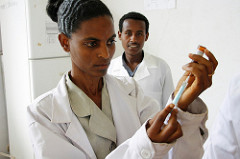The success of existing and future vaccine coverage will depend on the ability of low-income countries to attain high and equitable levels of coverage despite social and gender-related barriers.
Our role
To support this agenda, we worked with Gavi to inform the future direction and revision of its Gender Policy, with an additional aim to guide discussions for the development of its 2021-2025 strategy (‘Gavi 5.0’).
Our approach
To achieve this, we used theory–based, mixed methods and utilisation-focused approach to the evaluation in order to create engagement and a sense of ownership among the intended users, particularly country partners. Using participatory methods, we developed a re-constructed Theory of Change that explained the main change pathways for gender mainstreaming results within Gavi, and we also led co-creation activity to ensure that all recommendations were practical and relevant to Gavi’s wider impact agenda.
Contact David Walker (david.walker@itad.com) if you would like to discuss this project.
Image © Preparing a measles vaccine in Ethiopia. Credit: Pete Lewis / DFID (CC BY 2.0)


